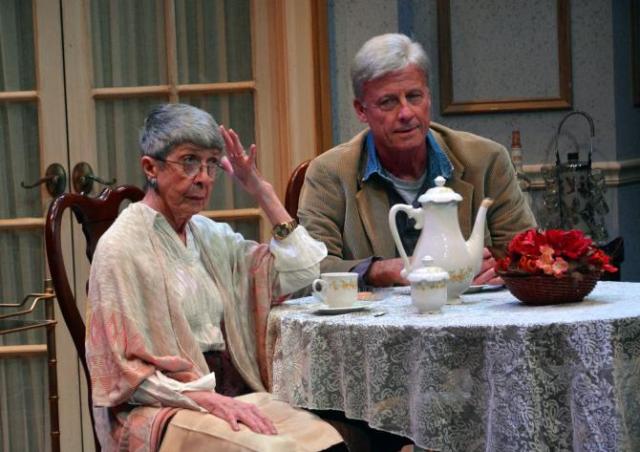
Israel Horovitz has written several versions of My Old Lady. He even sent The Banyan Theater revised elements of this very year’s latest version. Not having seen or read what came before, including a movie, I feel it still needs work to be a better play. A light comedy that gets darker, more melodramatic, as cultures and their representative characters clash, it uncovers a chain of mysteries. Most--but, importantly, not all--are family secrets.
When Mathias, 60, arrives in Paris to claim a once-elegant but currently elegantly located apartment, his sole inheritance except a watch from his father, he finds it occupied by Mathilde, 92. An old French real-estate plan, the “viager,” allows a cheap sale but requires the owner to fund its monthly expenses and to house its seller until death. With no money or New York home after three divorces, and unable to sell the Paris place, he’s lucky Mathilde will let him stay.
The arrangement does not, though, go over well with her daughter Chloe, 60, a teacher with something like a viager job at the school Mathilde founded to teach English. Chloe’s and Mathias‘s instant and intense mutual antipathy—why?—telegraphs that will change. So why does Chloe want to buy the apartment when she has accumulated enough money? Why hasn’t this attractive woman married, since she admits to having been proposed to?
The play’s major revelation is that Mathias‘s father and Mathilde were lovers. What attracted him to Mathilde? Wasn’t she pretty much a Bohemian—and if so, before or after her marriage? Is that what made it easy for her to “cheat”? Why didn’t the lovers get divorced and marry each other? Were politics, like hatred of Mitterrand, what they most had in common? Why was Mathias‘s father so concerned with the French fate of Jews? Are the charities thus connected that he left most of his money to? Is the date of his marriage important? Is there a blood relationship between Mathias and Chloe? Because drinking seems to be Mathias’s major pastime, is it justified in any way? What was his relationship to his mother? What was Mathilde’s attitude toward her? How and why did his brothers die, or did they? Just how bad a guy was Chloe’s father and does the answer to that question explain why he died leaving nothing? If Mathilde has a modest income fund and Chloe, who lives with her, is working and getting paid, why is the apartment so run down? Yet, at least in Banyan’s production, why are the women so well dressed? (Chloe in Act II even has matching shoes that are very contemporary in style.) Why isn’t there a fireplace or single sign of a heater or radiator, even if now poorly functioning, in the play’s “typical” Paris apartment? What’s the point of bringing up the hunter’s trophies that once occupied even the bedroom walls? Whose trophies were they really? Despite the play’s title, as the second act makes clear, it’s really about Mathias and how his father affected him—his real inheritance, as it were. He finds out that Chloe, too, was used by her mother. They have more in common than not. Is there hope for their interweaving their cultures? Did he and does he really have talent as a writer and will he be able to publish work that he’s been doing in Paris? It is to Peter Thomasson’s great credit that Mathias seems to be truly leaving self-pity behind for more self assurance. (His earlier drinking and drunk scenes are the best of the kind that I’ve ever seen.)
Donna Gerdes comes through as usual in complete command of her role, here as Mathilde. Chloe, a difficult character, comes finally to full life in Lilian Moore’s portrayal. Her French isn’t bad, either. It’s funny, though, to hear the mother and daughter speaking English when they’re alone together. Horovitz needs to give them a reason to do so.
Luckily, notably with pacing, Don Walker as director smooths over a number of difficulties. He especially makes good transitions happen. Most of the scenic ones benefit greatly from lighting changes as well as from jazzy music that unites Mathilde’s predominant era with the great popularity of jazz in France today. Director, cast, and crew make the play worth seeing despite its faults by emphasizing its considerable virtues.
